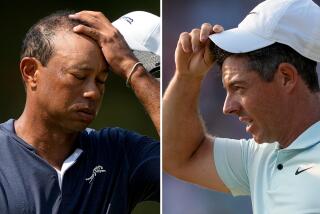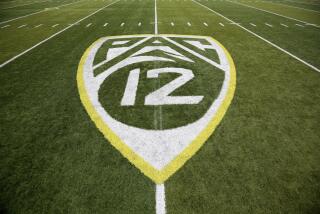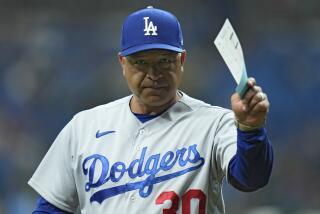McEnroe Says Mike to Blame : He Claims He Is Sorry, but It Wasn’t All His Fault, Either
- Share via
John McEnroe isn’t quite so flip as to offer a no-excuses explanation for his actions at the U.S. Open. Yes, he says, the behavior was a mistake. And McEnroe, while more upset about missing the year-ending Masters, is contrite about the blowup and subsequent two-month suspension from the professional tour.
In the aftermath of the Open incident, which occurred against Slobodan Zivojinovic in the third round, McEnroe’s press conferences there almost turned into a daily confessional, sporting style.
But, in the scheme of things, it didn’t have to happen, he reasoned.
The true villain according to John--is television. Now, weeks later, he still feels the same. For years, he has fought against having a television technician sit on-court with a boom mike, designed to pick up the sound of the ball, and, also able to pick up the raw, uncensored Mac.
“There shouldn’t be one of those mikes on the court,” said McEnroe, who defeated Miloslav Mecir, 6-2, 6-3, Monday night in the Michelin Challenge Series before a crowd of 5,775 at the Forum. “It just shows the power of TV right now. There needs to be decisions by the players and they need to get together. I would receive a percentage of less money to get things done to improve the quality.”
He pointed out that there aren’t microphones in the dugout at baseball games, or in the huddle, although, last week, Detroit’s Kirk Gibson was seen, and heard, swearing in the dugout during the American League championship series.
“It (swearing) looks funny as long as you can’t hear it,” McEnroe said. “Some things shouldn’t be heard for the sake of everybody and for the spectators. They know people say words like that. . . . Of course, it doesn’t sound good. But other sports have more control. With Gibson, the mike wasn’t that close. In baseball, the manager doesn’t look as bad when you don’t hear anything.
“As far as tennis goes, it’s still relatively new to the world of professional sports and it’s been taken advantage of.”
According to McEnroe, the only way to make a change is if the players could protest as a group. Which is about as unlikely as paving the grass courts at Wimbledon with cement.
“If you think the football union is weak, you should see our union,” McEnroe said. “We wouldn’t be able to stick together. We don’t have any strength. . . . I don’t see it happening. We compete on such an individual basis. There’s jealousy. The lower-ranked players are against the higher-ranked players. We are from different parts of the world competing in different parts of the world.
“They think if they give us more money, they think it’s OK. They can do what they want. Maybe it’s easy for me to say, but I would take less money if things were run differently. Money isn’t everything when you want to do the sport as well as you can. TV does have an influence when you can take control of the sports like that.”
However, his fight against the boom mikes and the powers that control tennis will probably continue to be as successful as battling windmills.
Which brings us to the suspension. Actually, it probably won’t hinder McEnroe’s career as much as people first thought. He had planned on playing tournaments in Los Angeles and San Francisco, which he won in 1986. But his wife, Tatum, hadn’t delivered their second son yet, so he withdrew from Los Angeles. He couldn’t play San Francisco because of the suspension. However, McEnroe said he wouldn’t have wanted to leave Tatum and the newborn Sean so quickly.
“My biggest disappointment is not being able to play in the Masters,” he said. “I grew up going to the Garden, and it’s always been special to me. Other than that my schedule really wouldn’t have been that different.”
That is why the suspension is almost hurting the game more than it is hurting McEnroe. He lost to Ivan Lendl, beat Jimmy Connors, Mecir and Mikael Pernfors before playing Paul Annacone in the final of a nationally televised special event at Atlanta. So, McEnroe picked up $150,000 for the victory. Meanwhile, a Grand Prix sanctioned tournament in Scottsdale, Ariz., featured a final between two non-top 10 players and was relegated to cable television and the winner earned $46,400.
And even though McEnroe’s results have come in exhibition events, it has given him added confidence he can make a more significant impact after rejoining the Grand Prix tour.
“There’s no more than four or five guys who have better years than I have had this year,” he said. “I just have to be in the right frame of mine and have a desire to get back. I had never wanted to be the best, it just happened. And now, I don’t feel I’ve given it my best shot to get back.”
Tennis Notes
Fifteen-year-old Michael Chang, who last weekend became the youngest player to reach the semifinals of a men’s Grand Prix tournament, defeated 18-year-old David Wheaton, 7-6, 4-6, 7-6, in a 2-hour, 25-minute preliminary match. Chang fought off two match points in the 10th game of the third set and won the decisive tiebreaker, 7-4. Chang is a sophomore at Valencia High School in Placentia, and Wheaton is a freshman at Stanford.
More to Read
Go beyond the scoreboard
Get the latest on L.A.'s teams in the daily Sports Report newsletter.
You may occasionally receive promotional content from the Los Angeles Times.











